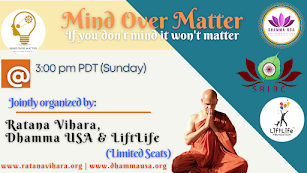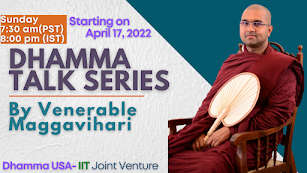I undertake to observe the precept to abstain from sexual misconduct.
I undertake to observe the precept to abstain from false speech.
I undertake to observe the precept to abstain from distilled and fermented
liquor (drinks and drugs) that causes intoxication or heedlessness.
3. Dedication of Funeral Clothe
Imaṃ mataka vatthaṃ bhikkhu saṅghassa dema ///
(I dedicate this funeral clothe to the community of Mahā Saṅgha)
4. Stanzas on Impermanence
Aniccā vata saṅkhārā - uppāda vaya dhammino
uppajjitvā nirujjanti - tesaṃ vūpasamo sukho /// (Mahā Parinibbāna Sutta)
(All things are impermanent -They arise and pass away
Having arisen they come to an end -Their coming to peace is bliss)
5.Transferring Merits
Idaṃ me ñātinaṃ hotu - sukhitā hontu ñātayo ///
(May this merit be shared with my relatives! May those relatives be well, and happy!)
6. Chanting
BUDDHA VANDANĀ - Homage to the Buddha
Iti’pi so bhagavā, arahaṃ, Sammā sambuddho,
Vijjā caraṇa sampanno, Sugato, lokavidū,
Anuttaro purisa damma sārathī,
Satthā deva manussānaṃ, Buddho, bhagavā’ti.
Such indeed is the Blessed One, exalted, Perfectly Enlightened, endowed with knowledge and virtues, Well-gone,
Knower of the worlds, a Supreme trainer of persons to be trained, Teacher of gods and men, Enlightened and
Blessed.
DHAMMA VANDANĀ - Homage to the Dhamma
Svākkhāto bhagavatā dhammo
Sandiṭṭhiko akāliko
Ehi-passiko opanayiko
Paccattaṃ veditabbo viññūhi’ti.
Well expounded is the Dhamma by the Blessed One,
visible here and now; not delayed in time,
inviting one to come and see; onward leading to Nibbana
to be attained by the wise, each for himself.
SAṄGHA VANDANĀ - Homage to the Saṅgha
Supaṭipanno bhagavato sāvaka saṅgho
Uju paṭipanno bhagavato sāvaka saṅgho
Ñāya paṭipanno bhagavato sāvaka saṅgho
Sāmīci paṭipanno bhagavato sāvaka saṅgho
Yadidaṃ cattāri purisa yugāni aṭṭha purisa puggalā
Esa bhagavato sāvaka saṅgho
Āhuneyyo pāhuneyyo
Dakkhiṇeyyo añjali karaṇīyo
Anuttaraṃ puññakkhettaṃ lokassā’ti.
Of good conduct is the Order of the Disciples of the Blessed One.
Of upright conduct is the Order of the Disciples of the Blessed One.
Of wise conduct is the Order of the Disciples of the Blessed One.
Of dutiful conduct is the Order of the Disciples of the Blessed One.
That is to say: the Four Pairs of Persons, the Eight Kinds of individuals,
this community (Saṅgha) of the Blessed One's disciples
is worthy of gifts, is worthy of hospitality,
is worthy of offerings, is worthy of reverential salutation,
is an incomparable field of merit for the world.
Karanīyametta Sutta
Karaṇīya Mettā Sutta (Sn 1.8)
The Discourse on Loving-kindness
Karaṇīyam-attha-kusalena, yantaṃ santaṃ padaṃ abhisamecca,
This is what should be done by one who is skilled in goodness and who knows the path of peace:
Sakko ujū ca suhujū ca, suvaco cassa mudu anatimānī,
Let them be able and upright, straightforward and gentle in speech, humble and not conceited,
Santussako ca, subharo ca, appakicco ca, sallahuka-vutti,
Contented and easily satisfied, unburdened with duties and frugal in their ways.
Santindriyo ca, nipako ca, appagabbho, kulesu ananugiddho.
Peaceful and calm, and wise and skillful, not proud and demanding in nature.
Na ca khuddaṃ samācare kiñci, yena viññū pare upavadeyyuṃ. Let them not do the slightest thing that the wise would later reprove,
Sukhino vā khemino hontu, sabbe sattā bhavantu sukhitattā. Wishing: In gladness and in safety, may all beings be at ease.
Ye keci pāṇa-bhūtatthi, tasā vā, thāvarā vā, anavasesā, Whatever living beings there may be, whether they are weak or strong, omitting none,
Dīghā vā ye mahantā vā, majjhimā rassakā aṇuka-thūlā, The great or the mighty, medium, short, or small,
Diṭṭhā vā ye ca adiṭṭhā, ye ca dūre vasanti avidūre,
The seen and the unseen, those living near and far away,
Bhūtā vā, sambhavesī vā, sabbe sattā bhavantu sukhitattā. Those born and to be born, may all beings be at ease.
Na paro paraṃ nikubbetha, nātimaññetha katthaci naṃ kiñci,
Let none deceive another or despise any being in any state.
Byārosanā paṭīgha-saññā, nāññam-aññassa dukkham-iccheyya.
Let none through anger or ill-will wish harm upon another.
Mātā yathā niyaṃ puttaṃ, āyusā eka-puttam-anurakkhe,
Even as a mother protects with her life her child, her only child,
Evam-pi sabba-bhūtesu, māna-sambhāvaye aparimāṇaṃ. So with a boundless heart should one cherish all living beings,
Mettañca sabba-lokasmiṃ, māna-sambhāvaye aparimāṇaṃ, Radiating kindness over the entire world: spreading upwards to the skies
Uddhaṃ adho ca tiriyañca, asambādhaṃ averaṃ asapattaṃ. and downwards to the depths, outwards and unbounded, freed from hatred and ill-will.
Tiṭṭhañ’caraṃ nisinno vā, sayāno vā, yāvatassa vigatam-iddho,
Whether standing or walking, seated or lying down, free from drowsiness,
Etaṃ satiṃ adhiṭṭheyya. Brahmam-etaṃ vihāraṃ idham-āhu.
One should sustain this recollection. This is said to be the sublime abiding.
Diṭṭhiñca anupagamma, sīlavā dassanena sampanno,
By not holding to fixed views, the pure-hearted one, having clarity of vision,
Kāmesu vineyya gedhaṃ, Na hi jātu gabbha-seyyaṃ punaretīti.
Being freed from all sense-desires, is not born again into this world.
Further Reading:

















































